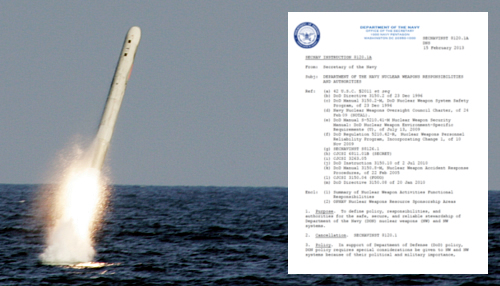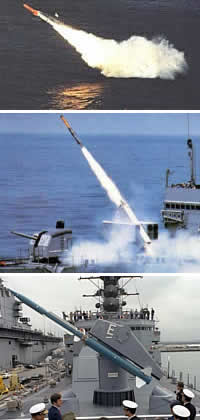
Posted on 03/18/2013 2:58:49 PM PDT by sukhoi-30mki
US Navy Instruction Confirms Retirement of Nuclear Tomahawk Cruise Missile

The U.S. Navy has quietly removed the nuclear Tomahawk cruise missile from its inventory, a new Secretary of the Navy Instruction shows.
By Hans M. Kristensen
Although the U.S. Navy has yet to make a formal announcement that the nuclear Tomahawk land-attack cruise missile (TLAM/N) has been retired, a new updated navy instruction shows that the weapon is gone.
The evidence comes not in the form of an explicit statement, but from what has been deleted from the U.S. Navy’s instruction Department of the Navy Nuclear Weapons Responsibilities and Authorities (SECNAVINST 8120.1A).
While the previous version of the instruction from 2010 included a whole sub-section describing TLAM/N responsibilities, the new version published on February 15, 2013, contains no mentioning of the TLAM/N at all and the previous sub-section has been deleted.
The U.S. Navy is finally out of the non-strategic nuclear weapons business. The stockpile has declined and a substantial number of TLAM/N warheads (W80-0) have already been dismantled.
The End Of An Era
The retirement of the TLAM/N completes a 25-year process of eliminating all non-strategic naval nuclear weapons from the U.S. Navy’s arsenal.
In 1989, diligent researchers using the Freedom of Information Act discovered that the navy planned to unilaterally retire three of its non-strategic nuclear weapons.

Retirement of the TLAM/N comes two decades after the U.S. Navy retired the SUBROC, ASROC, and Terrier.
The first to go was the SUBROC, a submarine-launched rocket introduced in 1965 to deliver a 5-kiloton nuclear torpedo against another submarine. The SUBROC was widely deployed on attack submarines for 24 years and retired in 1989.
The ASROC was next in line, a ship-launched rocket introduced in 1961 to deliver a 10-kiloton depth bomb against submarines. The ASROC was widely deployed on cruisers, destroyers, and frigates for 29 years and retired in 1990.
The third non-strategic nuclear weapon to be unilaterally retired was the nuclear Terrier, a ship-launched surface-to-air missile introduced in 1961 to deliver a 1-kiloton warhead against aircraft. The nuclear Terrier was retired in 1990 after 29 years.
These weapons had little military value but huge political consequences when they sailed into ports of allied countries whose governments were forced to ignore violation of their own non-nuclear policies to avoid being seen as disloyal to their nuclear-armed ally.
The Regan administration planned to replace all of these weapons with new types: the SUBROC would be replaced by the Sea Lance rocket; the ASROC would be replaced with the Vertical ASROC; and the Terrier was to be replaced by the Standard 2 missile. But all of these replacement programs were cancelled. The Harpoon cruise missile was also intended to have a nuclear warhead option, but that was also canceled. Originally 758 TLAM/Ns were planned but only 350 were built, and 260 were left when the Obama administration decided to retire the weapon.
After the unilateral retirement of the SUBROC, ASROC, and Terrier missiles, the navy was left with B61 and B57 bombs on aircraft carriers and land-based anti-submarine aircraft, as well as the TLAM/N. Work initially continued on the B90 NSDB (nuclear strike and depth bomb) to replace the naval B61 and B57, but in September 1991 president George H.W. Bush unilaterally cancelled the program and ordered the offloading and withdrawal of all non-strategic nuclear weapons.
The Clinton administration’s 1994 Nuclear Posture Review followed up by denuclearizing the entire surface fleet, leaving only TLAM/N for some of the navy’s attack submarines. The missiles were stored on land, however, and never made it back to sea.
In the early part of the George W. Bush administration, the navy wanted to retire the TLAM/N, but some officials in the National Security Council and the Office of the Secretary of Defense insisted that the weapon was needed for certain missions in defense of allied countries. As a result, the TLAM/N survived the 2001 Nuclear Posture Review, and up through 2005 the navy continued to test launch the missile from attack submarines.
Some official and lobbyists tried to protect the TLAM/N during the 2009 Congressional Strategic Posture Commission process, but they failed. The Obama administration’s 2010 Nuclear Posture Review determined that the TLAM/N should finally be retired because it was redundant.
Implications
More than two decades after the end of the Cold War, and tens of millions of dollars and countless of navy personnel hours wasted on retaining the TLAM/N, the weapon has finally been retired and the navy is out of the non-strategic nuclear weapons business altogether.
This is monumental achievement and marks the end of a long process. In 1987, the U.S. Navy possessed more than 3,700 non-strategic nuclear weapons for use by almost 240 nuclear-capable ships and attack submarines in nuclear battles on the high seas. Today the number is zero.
Submarine crews can finally focus on real-world operations without the burden of non-strategic nuclear weapons, and government officials from the United States and its Pacific allies can finally begin to think about how to structure extended deterrence without clinging to the Cold War illusion that it requires tactical naval nuclear weapons.
I only wish the Obama administration and its allies were not so timid about the achievement. The unilateral elimination of naval non-strategic nuclear weapons is an important milestone in U.S. nuclear weapons history that demonstrates that non-strategic nuclear weapons have lost their military and political value. Russia has partly followed the initiative by eliminating a third of its non-strategic naval nuclear weapons since 1991, but is holding on to the rest to compensate against superior U.S. conventional naval forces.
But why not propose to Russia that they follow the TLAM/N retirement by retiring their nuclear land-attack cruise missile, the SS-N-21, and stop building new ones? The land-attack cruise missiles have nothing to do with compensating for naval conventional inferiority. Highlighting the retirement of the TLAM/N, moreover, might even help undercut some of the North Korean Generals’ rhetoric about a U.S. nuclear threat. Milk the TLAM/N retirement for all it’s worth!
Documents: SECNAVINST 8120.1 (2010) | SECNAVINST 8120.1A (2013) | Non-Strategic Nuclear Weapons (FAS, May 2012)
This publication was made possible by a grant from the Ploughshares Fund. The statements made and views expressed are solely the responsibility of the author.
Kim Jong Un is deeply saddened.
The list, Ping
Let me know if you would like to be on or off the ping list
Personally I think the author is a maroon, it’s this
kind of thinking that has got us into the weakened
condition we now face.
Obama is setting us up. He’s taking all of our defenses down. He can’t get rid of nukes fast enough, China and Russia have far, far more than we have now.
It’s like he’s begging for us to be first-striked.
If this isn’t treason I sure as hell don’t know what is.
Unilateral disarmament, plain and simple.
********
Obama has more flexibility now. Medvedev and Putin are happy.
we’ve disarmed to almost nothing (I’ve heard as low as 800 warheads)
meanwhile, the Russians and Chinese are building up
all at a time when we’re borrowing more and more from the Chinese... with no ability to ever pay It back (war is inevitable)
“Unilateral disarmament, plain and simple.”
The little prick said that he would do that. And, apparently, a majority of the American people agree with him.
We are so screwed.
 This publication was made possible by a grant from the Ploughshares Fund.
This publication was made possible by a grant from the Ploughshares Fund.now there's a real Patriotic organization with the best interests of America at heart... NOT!!!
I guess I will get to see us nuked in my lifetime after all. It will be rather one-sided. Treason.
Apparently none of the Freepers who think this is a bad thing ever had custody of one of these tactical nukes. They were the reason that the torpedo room watches got higher radiation doses than the Engineering Lab Technicians who sampled reactor coolant. We were very happy when the nuclear torpedo was the first to go. It counted how many times its propeller went around to tell how far it had gone before it blew up. The SUBROC could really only be fired at convergence zone contacts, so the pressure wave from the blast would be focused back on the launch platform. At least most of the Tomahawks were outside in the ballast tanks, but still, loading and unloading was a real pain. So I say good riddance.
The author of this piece is obviously a determined anti-nuclear type. However, that being said, all he is enthusiastic about is that we are replacing small nuclear weapons with big ones.
So instead of using a few tactical nukes against some fool like Kim, we will have to use a MIRV ICBM. Which likely means melting North Korea instead of just a small piece of it.
Even worse is that we could have used these tactical weapons to threaten upstart nuclear weapons powers so that they not throw their nukes at their hated enemies.
Disclaimer: Opinions posted on Free Republic are those of the individual posters and do not necessarily represent the opinion of Free Republic or its management. All materials posted herein are protected by copyright law and the exemption for fair use of copyrighted works.